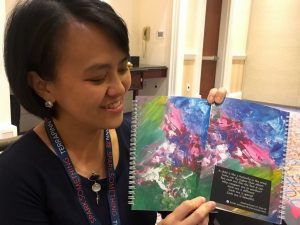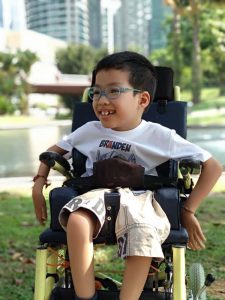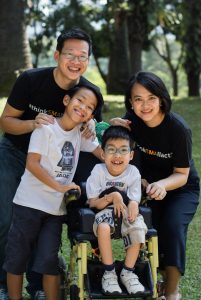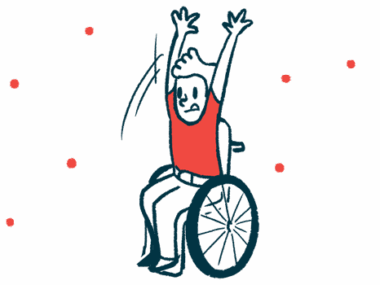Australia Adds Spinraza to Subsidized Coverage for SMA Kids, But Malaysia Still Waiting
Written by |
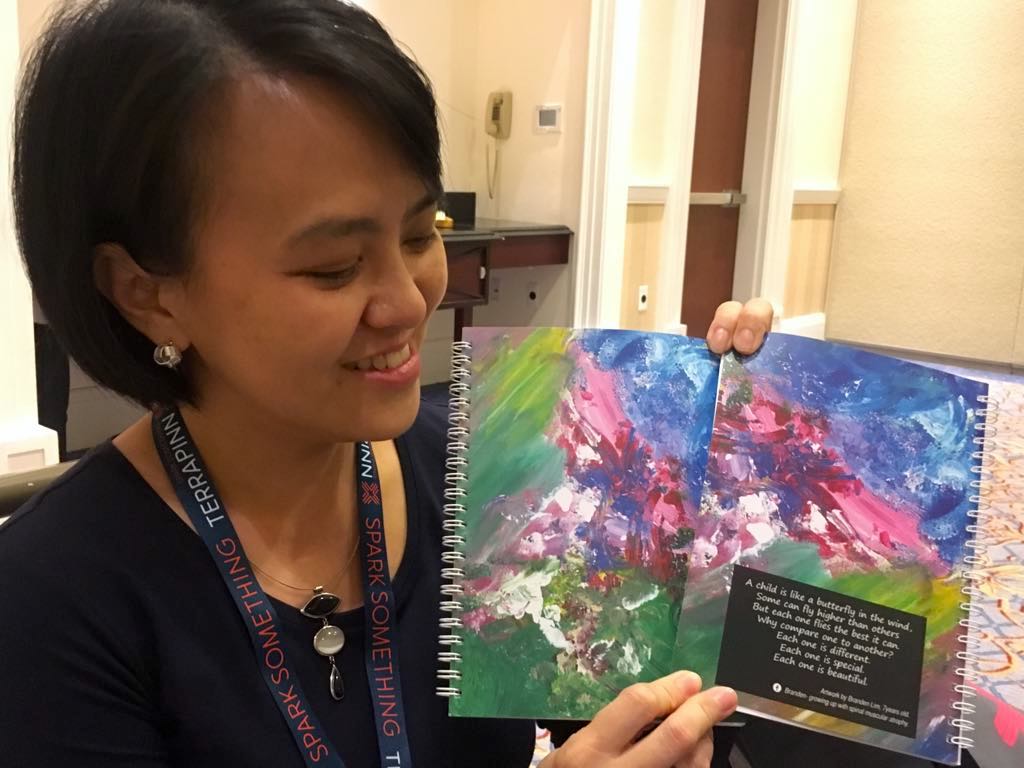
Sook Yee Yap shows a painting by her son, Branden Lim, 8, who has SMA. (Photo by Larry Luxner)
If 8-year-old Branden Lim had been born in Australia instead of Malaysia, his parents soon would have no problem obtaining Spinraza (nusinersen) to treat his spinal muscular atrophy (SMA).
Australian Health Minister Greg Hunt recently announced that, effective June 1, his ministry would add the Biogen therapy to its Pharmaceutical Benefits Scheme (PBS) for the treatment of type 1, type 2 and type 3a SMA for all patients younger than 18. That means Australians will pay about AU$40 (about $30 U.S.) per script for a therapy which, in the U.S., carries out-of-pocket costs of $375,000 annually and $750,000 for a first year of treatment.
Covering Spinraza on the PBS will cost taxpayers AU$241 million a year (about $181 million U.S.), but Hunt said it’s worth the expense. Estimates are that one in every 40 Australians carry the recessive gene that causes SMA.
“I have spoken to countless families about the need for this vital medicine, and I know what a positive difference it will now make. It delivers hope for so many beautiful young patients and their families,” Hunt said in a press release. “This vital medicine will no longer be out of reach.”
Hunt also thanked Biogen for “immediately opening up compassionate access to Spinraza” on May 1 — a full month ahead of the treatment’s PBS listing.
Australia’s Pharmaceutical Benefits Advisory Committee approved Spinraza in April after having rejected it in 2017. That reversal followed intensive lobbying by families of SMA children, including 20-month-old Aviana McElwee of Darwin, who last year became the first Australian baby to receive Spinraza.
Meanwhile, Biogen also has announced it will make Spinraza available to all type 1 SMA patients in New Zealand through its access program. That decision has thrilled Anna Sutherland of Rotorua, whose 2-year-old son, Heath, has SMA.
“Oh, my lord,” she told the New Zealand Herald in a May 10 story. “You have no idea. You can’t imagine what this means to us. I can’t even find the words.”
Struggle continues for Malaysian family
No such help is on the way for Branden Lim, who has type 2 disease.
Sook Yee Yap, the boy’s mother, founded We CARE Journey along with her husband in June 2016. Yap also is vice-president of the Malaysian Rare Disorders Society, established in 2007.
Yap, 42, spoke with SMA News Today during last month’s World Orphan Drug Congress in Maryland. She said she knows of only 40 cases of SMA in Malaysia, and “the challenge to find patients is very difficult.”
Given SMA’s prevalence of one in 10,000 births, it seems reasonable that SMA cases number in the thousands in a country of 32 million.
Most Malaysian SMA cases are diagnosed at hospitals in Kuala Lumpur, and We CARE Journey has not been able to find any affected children in the distant provinces of Sarawak and Sabah.
“Culturally, Asians are quite shy about showing any disability, especially with genetically linked diseases,” she said. “In addition, some parents are afraid that genetically linked diseases could affect the perception of others towards siblings, for example making them less desirable as potential mates.”
Besides Australia and New Zealand, authorities in nearby Japan, Hong Kong, Taiwan and South Korea also have approved Spinraza — administered every four months by intrathecal injection after an initial “loading” round — to treat SMA.
“Of course, Spinraza would help, but we can’t get it in Malaysia,” Yap said. “We don’t have national health insurance. We don’t have Medicaid, and private insurance doesn’t cover anyone with a congenital birth defect, so everything is out of pocket.”
New government gives reason for hope
The Malaysian government began allocating funds this year for enzyme replacement therapy, Yap said, noting the country’s entire 2018 budget for rare diseases is $2.5 million. Still, that’s up from zero in previous years.
“My son can’t get into any school in Malaysia, so we homeschool him,” said Yap. “He’s not on any ventilation support yet, but he has respiratory care using a cough assist machine.”
We CARE Journey has acquired cough assist machines through public donations, and loans those machines to SMA patients throughout Malaysia. It also supports the SMA community with wheelchairs, standing frames and flu vaccinations to protect not only patients, but families, too.
“We’re trying to do a prevalence survey of SMA in Malaysia, using a survey developed by Cure SMA [of Chicago],” she said. “They’ve agreed to that.”
The organization won a contest for designing a prototype gripping aid device that enables Branden to write, draw and hold objects like spoons. The contest, #ThisAbility Makeathon 2017, carried a $5,000 prize and was organized by Unicef.
Meanwhile, Yap said she’s encouraged by national elections earlier this month, in which a new coalition (Hope Pact) unseated Malaysia’s ruling party after 61 years in power.
“We hope this new government will give us a chance to work together with Biogen and other pharmaceutical companies to bring clinical trials to Malaysia and get the therapies our children need,” she said.
